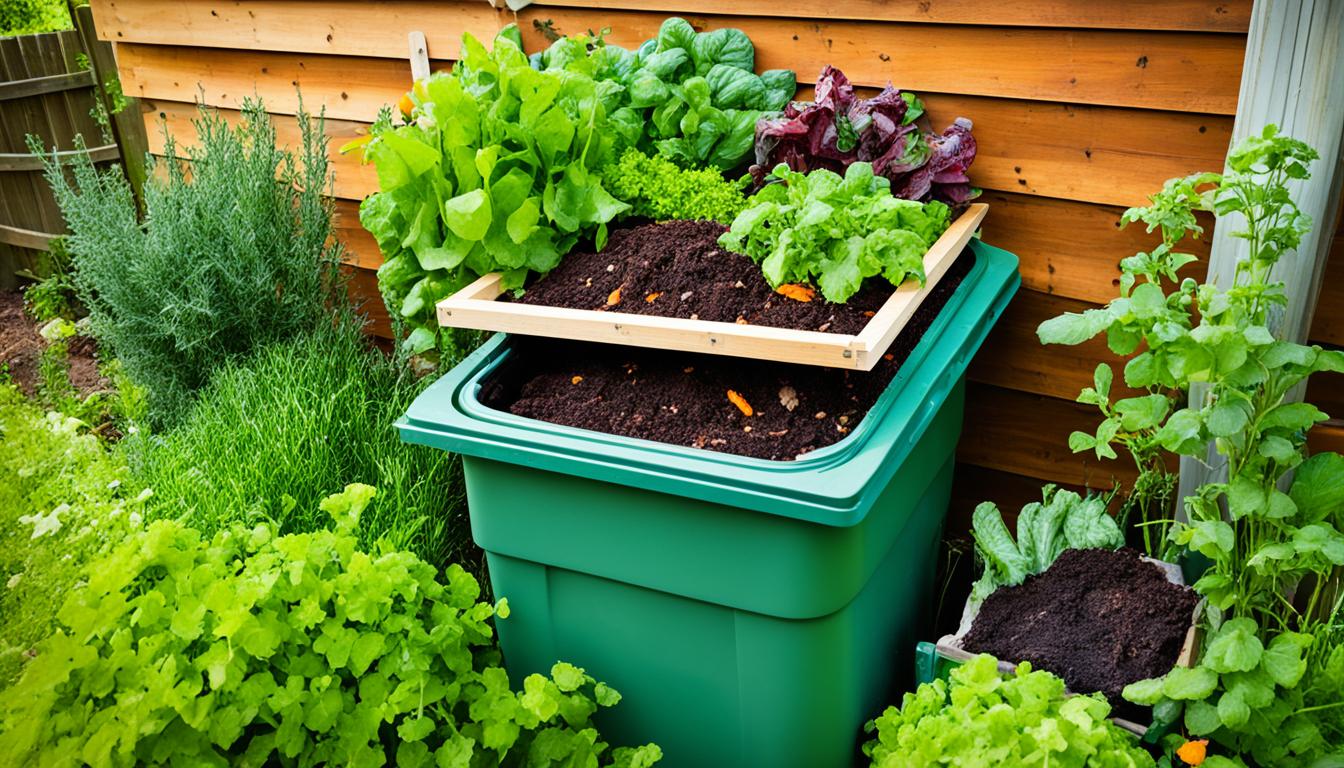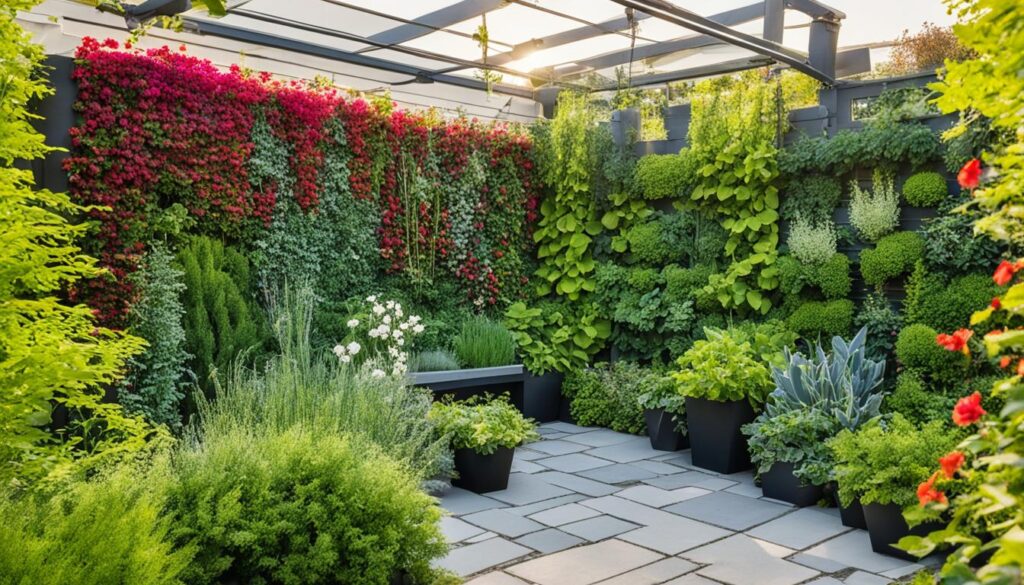Greetings, fellow eco-conscious gardeners! Are you looking for a simple and sustainable way to reduce waste and nourish your home garden? Look no further than home composting. Not only does it lend a helping hand to organic waste management, but it also provides you with nutrient-rich compost for your plants. In this article, I’ll share some easy and effective tips for successful home composting.
Key Takeaways:
- Composting is an eco-friendly method for reducing waste and enriching your home garden.
- Choose a composting method based on your available space and preferences, such as backyard composting, indoor composters, or vermicomposting.
- Get started with composting by gathering suitable materials, selecting a proper location, and maintaining the compost pile.
- Home garden composting benefits not only your garden but also the environment, by reducing food waste and supporting sustainable gardening practices.
- Start composting today and enjoy the rewards of a greener, more sustainable garden.
Choosing a Composting Method
When it comes to composting, you have several options to choose from based on your available space and preferences. Let me guide you through the different methods of composting.
Backyard Composting
Backyard composting is a popular method that involves creating a compost pile or using a compost bin in your outdoor space. This method is suitable for those with larger yards. With backyard composting, you can easily turn your kitchen scraps and yard waste into nutrient-rich compost that will nourish your plants. Not only does it reduce the amount of waste going to the landfill, but it also helps in creating healthy soil for your garden.
Indoor Composter
If space is limited or if you want faster results, an indoor composter is a convenient option. You can place it in your kitchen or any other suitable indoor area. The indoor composter is designed to break down food scraps quickly without causing any odor. It uses a controlled environment to facilitate decomposition, resulting in rich compost that can be used in your garden or potted plants. It’s a great solution for those who live in apartments or have small yards.
Click here for more Information Indoor Composting.https://amzn.to/4bNbEYm
Vermicomposting
Vermicomposting is another effective method of composting that involves using worms to break down organic materials. It can be done both indoors and outdoors, making it a versatile option. The worms, typically red wigglers or earthworms, consume the organic waste and convert it into nutrient-rich worm castings, also known as vermicompost. Vermicomposting is a highly efficient process that produces high-quality compost in a relatively short time.
Click Here for Worming Casting
When Composting make sure you have appropriate gloves and avoid touching your face, ears, mouth and nose.
| Method | Best for | Benefits |
|---|---|---|
| Backyard Composting | Larger yards | – Converts organic waste into nutrient-rich compost – Reduces landfill waste – Improves soil health |
| Indoor Composter | Limited space or quick results | – Odor-free composting – Convenient for urban dwellers – Produces rich compost for plants |
| Vermicomposting | Indoor or outdoor use | – Efficient and fast composting process – Suitable for small spaces – Produces nutrient-rich worm castings |
Choosing the right composting method depends on your specific needs and constraints. Consider factors such as available space, time commitment, and desired composting speed. Whichever method you choose, remember that composting is a sustainable way to recycle organic waste and nourish your garden with natural fertilizers.
To visualize the different composting methods, take a look at the image below:
In the next section, I’ll guide you through the process of getting started with composting. Stay tuned!
Getting Started with Composting
To get started with composting, there are a few key steps to follow. First, gather the right composting materials.It is important to use a combination of food scraps, yard waste, paper products, and other organic materials. These materials provide the necessary carbon and nitrogen elements for decomposition. Remember to avoid adding meat, dairy, oils, and chemically treated wood to your compost pile, as these can cause unpleasant odors or slow down the decomposition process.
Once you have your materials, it’s time to choose a suitable location for your compost pile or bin. Consider factors such as sunlight and drainage. Ideally, your compost pile should receive partial sunlight to aid in the decomposition process. It’s also important to ensure proper drainage to prevent excess moisture. Too much water can lead to a smelly, anaerobic compost pile.
Click her for Bin suggestions;
Composting Tips
- Layer your composting materials: Alternate layers of carbon-rich materials (such as dried leaves or newspaper) with nitrogen-rich materials (such as vegetable scraps or grass clippings) to create a balanced compost pile.
- Turn your compost regularly: Stirring or turning your compost pile every few weeks helps to aerate it and speed up decomposition. This allows the materials to break down more efficiently.
- Keep your compost moist but not too wet: Your compost pile should have the consistency of a damp sponge. Check the moisture level regularly and water it if necessary.
- Monitor the temperature: A well-maintained compost pile should reach temperatures between 120°F and 160°F. Use a compost thermometer to ensure proper decomposition. If your compost is not heating up, it may need more nitrogen-rich materials.
By following these tips, you can successfully start and maintain a compost pile in your home garden.
Remember, composting is a natural process that takes time. Depending on the materials used and the environmental conditions, it can take anywhere from a few months to a year for compost to be ready for use in your garden. Patience and regular maintenance are key to a successful composting journey.
Composting Materials and Ingredients
| Carbon-rich Materials | Nitrogen-rich Materials |
|---|---|
| Dried leaves | Vegetable scraps |
| Newspaper | Grass clippings |
| Wood chips | Coffee grounds |
| Straw | Tea leaves |

Maintaining your compost pile is essential for successful decomposition. Regularly turning your pile, monitoring its moisture level, and ensuring proper temperature will help speed up the process. With these composting tips and the right materials, you can create nutrient-rich compost to improve the health and fertility of your garden.
Conclusion
Home garden composting is an essential practice for ecological gardening and organic waste recycling. It offers an easy and eco-friendly way to reduce waste, create nutrient-rich soil, and promote sustainable gardening practices. By following the tips and guidelines mentioned in this article, you can successfully compost in your home garden and contribute to the reduction of food waste and the cultivation of healthier plants.
Composting not only benefits your garden but also helps in reducing your carbon footprint and supporting a more environmentally friendly lifestyle. By diverting organic materials from landfills, you are actively participating in the cycle of nature and minimizing the release of greenhouse gases. Incorporating compost into your soil enhances its fertility, improving water retention, and reducing the need for chemical fertilizers.
Start composting today and reap the rewards of a greener and more sustainable garden. Not only will you be contributing to a healthier environment, but you will also enjoy the satisfaction of knowing that you are actively taking part in organic waste recycling and ecological gardening. Embrace the power of home garden composting and create a thriving ecosystem right in your backyard!

